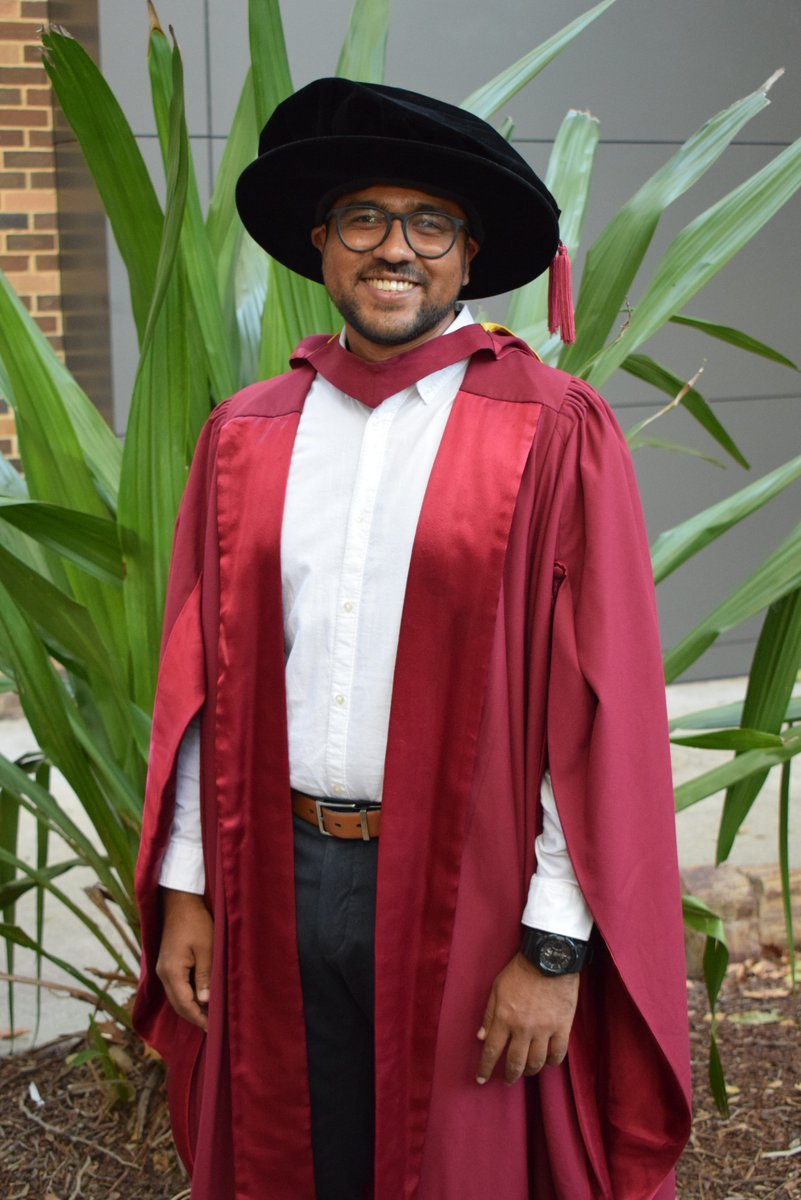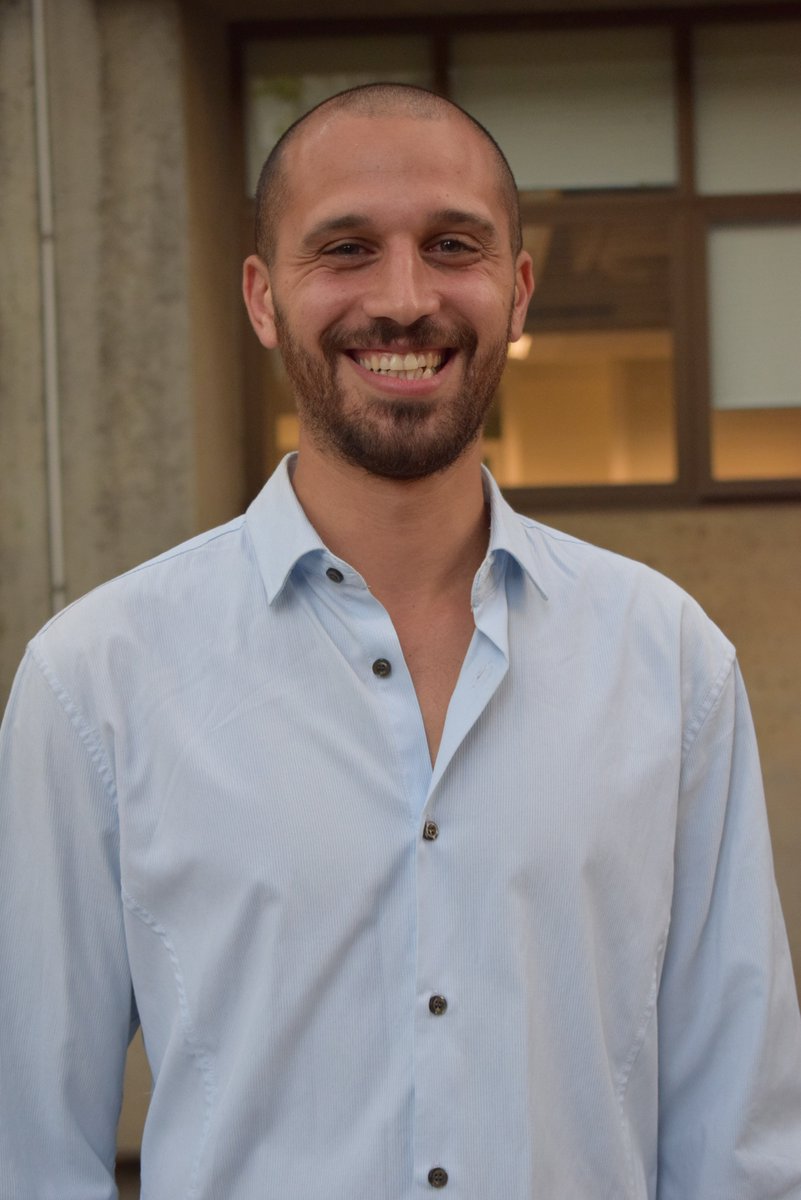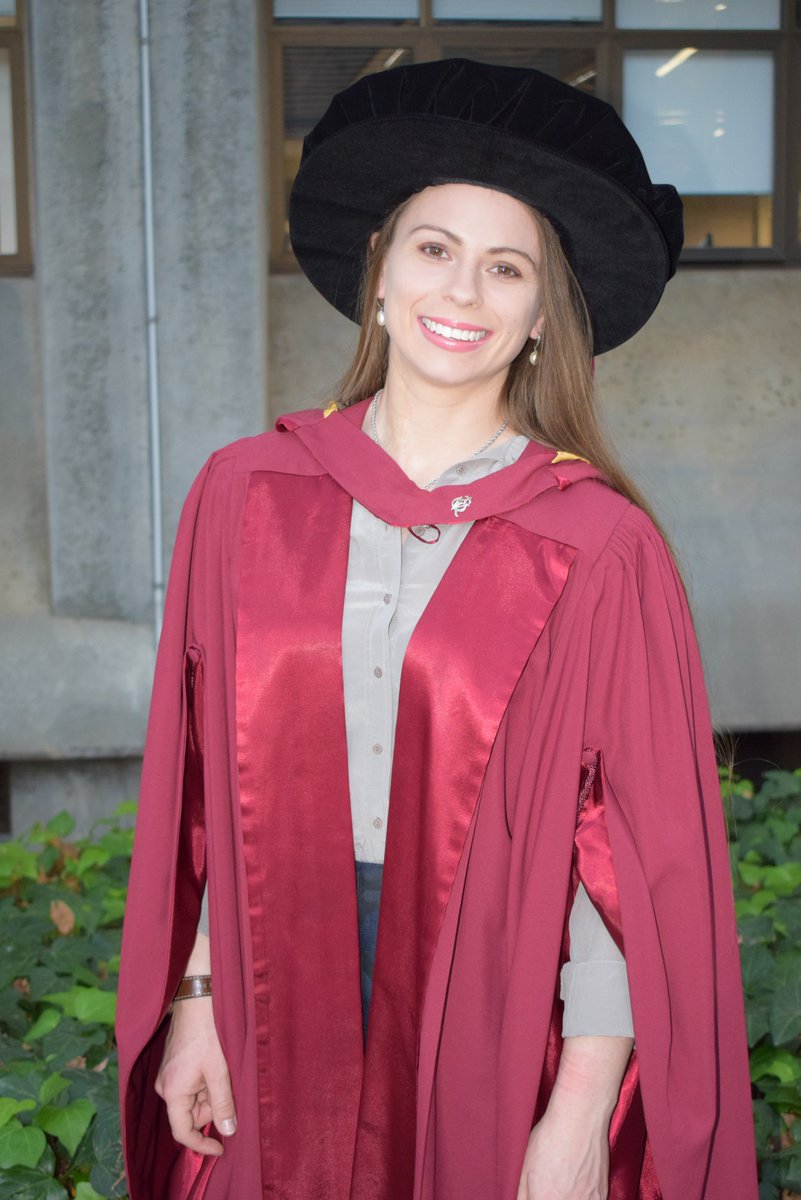Characteristics of the soil seed bank of invasive and non-invasive plants in their native and alien distribution range
By: Gioria, Margherita, Johannes J. Le Roux, Heidi Hirsch, Lenka Moravcová, and Petr Pyšek. Biological Invasions: 1-20. | Find with Google Scholar »
|
Hi all,
Congratulations to all our graduates at last week’s ceremony – some of the happy faces are shown below. Samiya Tabassum gave a great Graduate Speaker address and everyone looked splendid in their robes! Congrats to Tim Ghaly on his University Medal.
This week we help a L&T planning day and discussed how best to support sustainable delivery of excellent teaching, among other things. It was a productive day and thanks to Drew & Caitlin for organising and to all those who contributed.
cheers,
Michelle
-click thumbnail for larger image-
Save the Date
This coming week 6th – 10th May
Tue 7th: Department Meeting; 1.00pm – 2.00pm; 14EAR(E8A)-280 (Biology Tea Room).
Wed 8th: Department Morning Tea; 10.30am – 11.30am; 205b Culloden Rd.
Wed 8th: Department Seminar – Prof Dieter Hochuli, USyd; 1.00pm – 2.00pm; 14EAR(E8A)-280 (Biology Tea Room).
Thu 9th: Ask An R Geek for Help (aaRgh); 3:30 PM – 4:30 PM; Continuum room (75 Talavera road, room 3114); snacks provided.
Following week 13th – 17th May
Wed 15th: FSE Women in Stem Morning Tea, hosted by Biological Sciences; 10.30am – 11.30am; Biology Courtyard (or Biology Tea Room if raining). RSVP here: http://bit.ly/2Y5mEJB
Wed 15th: Department Seminar – Dr Giulia Ghedini, Monash University; 1.00pm – 2.00pm; 14EAR(E8A)-280 (Biology Tea Room).
Thu 16th: Biology Social Club; 5.00pm – 7.00pm; Biology Courtyard.
Weekly Events
Thu: Venture Cafe; 3–8pm; (map).
Fri: Writing workshops with Prof Ken Cheng – to support HDRs and ECRs with scientific writing; 2–4pm; Ken’s office at 205b Culloden Road, G12.
Fri: Behaviour and Evolution Journal Club; Friday at 12:30pm (bring your lunch); 205B Culloden Rd Boardroom.
Weekly Biological Sciences seminar program is here
Weekly Molecular Sciences seminar program is here
Future Events
May 23rd: Workshop on introduction to tidyverse package in R; 3:30 PM – 4:30 PM; Continuum room (75 Talavera road, room 3114); snacks provided.
June 11th-13th: HDR Conference 2019, 9am-1pm, Panel Interviews: 2-5pm; venue TBD – Save the date!
General News and Announcements
Congratulations to Simon Clulow for winning this year’s Southwood Prize – the Journal of Applied Ecology’s award for the best paper by an early career researcher in 2018 . Find out more about Simon and his winning paper here: http://ow.ly/s53Z50scwYt
Looking for the Next FSE Stories – Suzannah Lyons <suzannah@scienceinpublic.com.au> is in the process of compiling Barbara’s next newsletter, which means she’s keen to hear about your upcoming stories. If you or a member of your team have an interesting paper coming out, a staff accolade you’d like to celebrate, or items for the Faculty news and notices section, please get in touch as soon as you can, especially if it’s a potential media story. If she have a couple of weeks’ notice she can do a better job with the story.
Plant of the Week will return next week!
Call for Research and Professional Development Workshop Suggestions The Department is compiling a program of workshops focused on research and professional development for postgraduate students and ECRs in the Biological Sciences, and we want your suggestions! Perhaps there is a particular skill you want to develop or advice that you are seeking. Or you may want to deliver a session on something relevant! This could range from writing and data analysis, to publishing and interview skills, and anything in between. We are looking for suggestions of workshop topics as well as nominations for people or groups to run them.
Please submit your suggestions via this google form: https://forms.gle/KaYnCr4fp2b1ucWm8
OPPORTUNITIES
Faculty Staff (Professional & Academic) Travel Grants – support for staff travel is now provided centrally by the Faculty. Funding is available for ECR travel, international collaboration, teaching and professional staff development. If you would like to apply, please discuss with your supervisor and A/Prof Andrew Barron (for research travel) or Dr Drew Allen (for teaching travel). Research Eligibility and application details can be found here.https://staff.mq.edu.au/intranet/science-and-engineering/faculty-awards,-schemes-and-procedures
Two rounds remain for the rest of the year:
– Round 2 closes Friday 31 May 2019
– Round 3 closes Friday 27 September 2019
Apply as soon as possible for any travel you intend on taking in 2019, that meets the criteria. Funds awarded must be spent in 2019 and will not be carried into 2020.
SEMINARS AND WORKSHOPS
Biological Sciences Seminar – Date/Time: Wednesday, 8th May, 2019; 1pm – 2pm. Speaker: Prof Dieter Hochuli, USyd. Title: Life in the City: how nature persists in urban environments and why it matters Venue: 14EAR-280 (Biology Tea Room). More information on this and all department seminars ON OUR WEBPAGE HERE.
Molecular Sciences Seminar – Date/Time: Tuesday, 7th May, 2019; 1pm – 2pm. Speaker: Professor Nilay Hazari, Department of Chemistry, Yale University; Title: Iron Complexes for the Reversible Hydrogenation of Carbon Dioxide to Formic Acid or Methanol. Venue: 4WW 322 seminar room. More Information: https://goto.mq/7n
And: Date/Time: Tuesday, 14th May, 2019; 1pm – 2pm. Speaker: Dr Dominic Glover, School of Biotechnology and Biomolecular Sciences, UNSW; Title: Redesign of Protein Interfaces for the Assembly of Functional Biomaterials. Venue: 4WW 322 seminar room. More Information: https://goto.mq/6s
R-Users Group (RUG) Fortnightly Help Sessions – Do you have a problem with data analysis? You might want to give R a go which is a fantastic analytical and plotting tool. For all your R-related queries, drop by ‘Ask An R Geek for Help’ (aaRgh) session where you can get one-on-one assistance. No registration is required and there will be snacks and beverages. Date: 9 May, 2019. Time: 3:30 PM to 4:30 PM. Venue: Continuum Room (75 Talavera Road, room 3114).
Wildlife at the Watering Hole – 3rd Tuesday of each month, 6:30pm @ Botany View Hotel, King St Newtown!
Sensing Technology Conference 2-4 Dec – The 13th International Conference on Sensing Technology (ICST 2019) will be held on December 2 to 4, 2019 at Macquarie University. Topics include vision sensing, biological sensors, acoustic, noise & vibration sensors, sensor arrays and application of sensors. The conference flyer with all details is attached here.
FUNDING OPPORTUNITIES
There is a wide range of funding opportunities available for research, travel and conference support, closing dates generally 1st June. For details see here
HDR NEWS AND OPPORTUNITIES
PhD Students: got a grant? Dept. will co-fund up to $1500 – The Department would like to encourage students to seek external sources of funding, and has a small budget with which to support successful candidates.New limits from 2019:PhD students ONLY: Dept. will match up to $1500 of external (non-MQ) funding ONCE during the student’s candidature.
If you have received a grant (student as chief investigator) and wish to request co-funding, please forward a copy of the award letter to <sharyon.odonnell@mq.edu.au> and <julian.may@mq.edu.au>.
Australian Wildlife Society University Research Grants are scholarships offered to honours or postgraduate students at Australian universities. Each year, ten $1,500 grants are awarded. Applicants wishing to become a member of the Society can do so at www.aws.org.au. Closing date: 31st May 2019.
Are You a HDR Student? Need Help with Writing? – HDR Mentors in collaboration with HDR Learning Skills is running another round of Peer Writing Assistance (PWA) for the rest of the year! This program is designed to support MRES and HDR candidates in managing thesis writing and research-related concerns. All peer writing assistants have undergone training for their role and are current PhD candidates at Macquarie. Registrations are now open for individual consultation bookings. If you are interested, please go to book in for a 30-minute session with a PWA. If you have questions about the PWA program please email hdrmentors@mq.edu.au>
ADMIN THINGS
Outreach Activities – Have You Participated in an Activity for Biology Recently? Don’t forget to fill in the super-quick form here – ACCESS OUTREACH FORM HERE
Building Name Changes – Cheat Sheet – If you are trying to identify buildings on campus with new names or old names, please use this link to convert them from old to new or vice versa.
THIS AND THAT
Call for Yellow Pages Books: Any unwanted yellow pages books old or new can be donate to PGF. Pages will be used to line pots. Kindly leave them outside office 14EAR(E8A)-175.
THOUGHTFUL COMMENT (in Nature) FOR EVERYONE IN CONSERVATION RESEARCH:
Does high citation help conservation? from Oxford academic. (She also cites one of our postgrads, H.S. Grantham).
“We need a better understanding of how academic impact factors compare with, and translate into, measurable real-world outcomes”.
Interesting piece – Crispr Gene Editing in the Food Chain – https://www.abc.net.au/news/science/2019-04-30/crispr-gene-editing-in-the-food-chain/11053622
Harvest Hub – great food that doesn’t cost the earth
Do you want:
- To eat with the seasons?
- Have fresh fruit and veg delivered weekly?
- Buy from local growers and support local farmer more directly?
- Access weekly specials and a flexible, easy to use ordering system?
- Have produce delivered to you at work?
- Buy grains and cereals too?
Then try Harvest Hub www.harvesthub.com.au
Hub name: MACQUARIE04 F: @harvesthubau
More information?
- Check out the website
- Talk to Samantha Newton <samantha.newton@mq.edu.au>.
- Orders are delivered weekly, on Tuesdays
Correct Method for Submitting to Department Matters
Department Matters submissions now have their own email address. Please send all your news items for the newsletter to <fse.bionewsletter@mq.edu.au>
Also, please see the following to correctly format your additions, and keep them rolling in!
You may have noticed that we try to keep all the articles to the same format for the Department Matters, however, rest assured, they do NOT all turn up in this format! To help keep your Department Matters looking as good as possible, when sending in additions to the Newsletter, please try to keep these formatting guidelines in mind.
- Please write in third person. The information is coming from the Newsletter, not directly from you.
- Do not use fancy text formatting. Bold heading, normal text, and only italics or bold to highlight. No font size changes will make it through, sorry.
- If sending via email, set your email output to basic. HTML output will add all sort of formatting that will have to be removed before your article can go into the newsletter.
- Keep your submission short and direct (two paragraphs) and if possible provide a document, email or link where readers can get more information. Any long submissions will be cropped.
Keeping to these guidelines will streamline your article’s addition to the newsletter. Thank you.
Have You Missed Out on an Issue of Department Matters? Back issues can be found at this newsletter archive link for your reading pleasure.
New Publications
Fungal Neurotoxins and Sporadic Amyotrophic Lateral Sclerosis
By: French, Peter W., Russell Ludowyke, and Gilles J. Guillemin. Neurotoxicity research (2018): 1-12. | Find with Google Scholar »Translating Marine Animal Tracking Data into Conservation Policy and Management
By: Hays, G.C., Bailey, H., Bograd, S.J., Bowen, W.D., Campagna, C., Carmichael, R.H., Casale, P., Chiaradia, A., Costa, D.P., Cuevas, E. and de Bruyn, P.N., 2019. Trends in ecology & evolution. | Find with Google Scholar »Global warming impairs stock-recruitment dynamics of corals
By: Hughes, T.P., Kerry, J.T., Baird, A.H., Connolly, S.R., Chase, T.J., Dietzel, A., Hill, T., Hoey, A.S., Hoogenboom, M.O., Jacobson, M. and Kerswell, A., 2019. Nature, p.1. | Find with Google Scholar »Simulated Marine Heat Wave Alters Abundance and Structure of Vibrio Populations Associated with the Pacific Oyster Resulting in a Mass Mortality Event
By: Green, Timothy J., Nachshon Siboni, William L. King, Maurizio Labbate, Justin R. Seymour, and David Raftos. Microbial ecology (2018): 1-12. | Find with Google Scholar »Global Networks of Symbiodinium-Bacteria Within the Coral Holobiont
By: Bernasconi, Rachele, Michael Stat, Annette Koenders, and Megan J. Huggett. Microbial ecology (2018): 1-14. | Find with Google Scholar »Evolution of the eyes of vipers with and without infrared-sensing pit organs
By: Gower, D.J., Sampaio, F.L., Peichl, L., Wagner, H.J., Loew, E.R., Mclamb, W., Douglas, R.H., Orlov, N., Grace, M.S., Hart, N.S. and Hunt, D.M., 2019. Biological Journal of the Linnean Society, 126(4), pp.796-823. | Find with Google Scholar »Effective population size of the critically endangered east Australian grey nurse shark Carcharias taurus
By:Reid-Anderson, Sarah, Kerstin Bilgmann, and Adam Stow. Marine Ecology Progress Series 610 (2019): 137-148. | Find with Google Scholar »In the Media
Vanessa Pirotta was interviewed on 2SER The Daily
Dr Vanessa Pirotta from the Department of Biological Sciences was interviewed on 2SER The Daily about the discovery of a beluga whale off Norway that is believed to have escaped from a Russian military facility.
Culum Brown was featured on the BBC
Professor Culum Brown from the Department of Biological Sciences was featured on the BBC regarding a study showing sharks can learn to recognise jazz music.
Vanessa Pirotta was interviewed on ABC News and SBS News
Dr Vanessa Pirotta from the Department of Biological Sciences was interviewed on ABC News and SBS News about the discovery of a beluga whale off Norway that is believed to have escaped from a Russian military facility.











